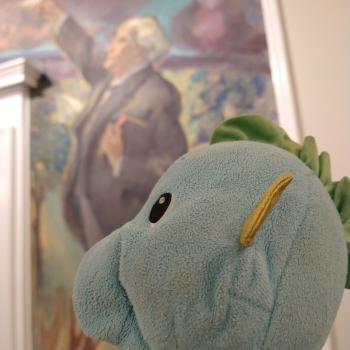Well, for once there is no need to ask if there is a doctor in the house, because I am sitting in a room full of them on the campus of Asbury University in Wilmore, KY as an attendee at a conference called Grace Prescriptions, aimed at Christian medical professionals who are looking for help in sharing their faith in their practice. Over the next couple of days I hope to report in several times as we stand at the intersection of faith, medicine, and healing. (This is something I have a personal interest in, despite being in no way shape or form a medical professional–I can’t stand the sight of blood!–because I’m the grand-daughter of the author of this book and have been committed to that intersection for most of my life.)
Before the conference even got started I had a nice chat with Bill Peel and Walt Larimore who are the “dispensers” of Grace Prescriptions.
 Walt is a family practitioner who completed a residency in family and sports medicine at Duke (which is my Ph.D. alma mater, so we had a little Durham, NC old-home-week.) He started out applying to seminary (he never heard back) and Campus Crusade (he got turned down) so he ended up in medical school at Louisiana State University (“Harvard on the Bayou…after Katrina it was Harvard under the Bayou”) as his third choice, “thinking it would be just a little first aid before I went to the mission field.” During medical school and residency he met with other Christians for mentoring and prayer, but when he started practicing in Kissimmee, FL he found few ways to integrate his faith with his work. One day his partner in the practice John Hartman, also a Christian, said to him, “Your faith is important to you. It is to me too. How come we don’t bring it to work?”
Walt is a family practitioner who completed a residency in family and sports medicine at Duke (which is my Ph.D. alma mater, so we had a little Durham, NC old-home-week.) He started out applying to seminary (he never heard back) and Campus Crusade (he got turned down) so he ended up in medical school at Louisiana State University (“Harvard on the Bayou…after Katrina it was Harvard under the Bayou”) as his third choice, “thinking it would be just a little first aid before I went to the mission field.” During medical school and residency he met with other Christians for mentoring and prayer, but when he started practicing in Kissimmee, FL he found few ways to integrate his faith with his work. One day his partner in the practice John Hartman, also a Christian, said to him, “Your faith is important to you. It is to me too. How come we don’t bring it to work?”
Walt and John began to pray together about how to discover where their patients were on the spiritual journey and how to share that within medical ethical guidelines and “without clogging up the waiting room.” Eventually they began several practices: praying together and with nurses in the morning, praying with the staff once a week, and (based on the research of Walt’s friend and mentor David Larson from the National Institute for Healthcare Research) beginning to take “spiritual histories” from their patients–asking if God and faith were important to patients, if they were part of a faith community, and if they needed connection to religious communities. (He said that he worried these questions were “weird” until one of his mentors, a dairy farmer, said “Y’all ask a lot of weird questions.”)
Nurses made stickers saying “WIGD” [“What is God doing”] that they put on each chart to remind him to be alert to the movement of the Holy Spirit with each patient. “As I became more intentional,” he said, “there were divine appointments….pearls in the muck.” Walt was soon recruited by the Christian Medical and Dental Association to do a presentation about this–the conference aimed for 25 registrants for the presentation and got 475!
 Meanwhile Bill Peel, now the director of the Center of Faith and Work at LeTourneau University, had left local-church pastoral work in 1987 in order to work with workplace discipleship and in 1993 had begun to work for the CMDA, which had a lot of requests from professionals saying “teach us how to make our practice a ministry….by which they meant they wanted to do evangelism.” (You may remember Bill from our recent debate on sharing your faith in the workplace.)
Meanwhile Bill Peel, now the director of the Center of Faith and Work at LeTourneau University, had left local-church pastoral work in 1987 in order to work with workplace discipleship and in 1993 had begun to work for the CMDA, which had a lot of requests from professionals saying “teach us how to make our practice a ministry….by which they meant they wanted to do evangelism.” (You may remember Bill from our recent debate on sharing your faith in the workplace.)
Bill met Walt at a CMDA conference in Orlando, visited his practice, and helped Walt organize the interventions he was practicing into a course. They co-taught the first one in 1995 (then called Saline Solutions) at a resort center in North Carolina to a standing-room only crowd; Bill estimates about 10,000 people have gone through the course in one or another of its incarnations (it’s been “Grace Prescriptions” since 2013.) Four things are necessary for developing the kind of relationship in which sharing the gospel is appropriate, Bill says: professional competence, godly character, concern, and wise communication, which the course addresses: “finding out what the Holy Spirit is doing in a person’s life and coming alongside that.” (He once asked a friend who was a doctor at Vanderbilt, “Do you have to be careful talking about issues of faith?” His friend responded, “No, I have to be wise.”)
Ironically, many years later Walt found out that his seminary application had been accidentally lost, and he’d been turned down from Campus Crusade (“when in those days if you were breathing and had a testimony they took you”) because his interviewers thought God had something else in mind. They were right. 🙂
More from the conference coming up!
(Images: Dr. Walt.com, Center for Faith and Work, and Pixabay.)














